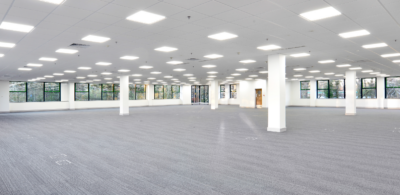Tech firms continue to dominate U.S. office leasing activity. As 2018 begins to unfold, is this likely to change? While continued economic growth and job creation, coupled with corporate tax cuts and business-friendly regulatory reform suggest the possibility of more widespread office demand across a range of business sectors, this in fact, has yet to occur. Office job growth is not translating into a broad increase in occupancy levels.
U.S. office absorption fell for a second successive year in 2017, down by 28% to 41.9 million square feet. This is less than half the level seen two years earlier in 2015. Lower demand from traditional office occupiers is a contributing factor. Driven by the need to control costs and increase space efficiency, some tenants are looking to reduce their office footprints and opting to stay in place rather than leasing new space elsewhere, with the legal sector being a prime example. In addition, although headcounts may be on the rise, some occupiers have vacant space that they can backfill.
Tech remains the exception. Tech leasing is primarily underpinned by business growth with firms taking down more space driven by innovation and the addition of new service lines. Looking across the top 10 U.S. office markets, there were 43 leases of 100,000 square feet or above signed by tech firms (here defined as ones whose primary business model is web-based) totaling 10.5 million square feet in 2017. The Bay Area remains ground zero for tech demand with 21 of these 43 leases. Seattle and Manhattan follow, both with five tech leases of 100,000 square feet or more signed in 2017 totaling 2.1 and 1.2 million square feet respectively.

In this context, Amazon’s dominance cannot be overstated. Amazon accounted for 11 of the 43 leases referenced above, primarily in Seattle. Despite building a three-million-square-foot campus in the Lake Union submarket, Amazon’s growth continues unabated. In the fourth quarter of 2017, the firm pre-leased a new 739,000-square-foot development at Rainier Tower II in Downtown Seattle and has already signed two more leases of above 100,000 square feet in 2018. As the firm continues to refine its options for its HQ2 location, Amazon is on track to become the second-largest employer in the Fortune 500 behind Walmart.
How is this impacting market performance? Not surprisingly, San Francisco and Seattle lead the pack among the major cities. Both markets saw Class A rent growth of more than 6% in 2017, while U.S. office rent growth came in at 1.8%. Class A vacancy in Downtown Seattle stands at 5.8%, which is just above half of the national level. Boston has also benefited from tech demand and has over one million square feet of known tech requirements in the market. One note of caution: some markets may become overly dependent on tech. In San Francisco, tech firms accounted for 61% of gross leasing activity in 2017, up from an already dominant 38% in 2015 and 2016.
Tech-centric second-tier markets such as Austin, Nashville, Portland and Raleigh-Durham, are also posting strong performances. With lifestyles attractive to millennials and a significantly lower cost base for firms and employees alike, these markets are prospering. Measured on a percentage basis, tech job growth in Austin, Charlotte and Indianapolis has outpaced the Bay Area. Class A rents in Downtown Nashville rose by 13.6% in 2017. Measuring 2017 downtown absorption as a percentage of inventory, turnover was 8.3% in Nashville, 6.3% in Raleigh-Durham and 3.7% in Austin, in sharp contrast to 0.4% for the U.S. overall. In Austin alone, there were six tech leases of 50,000 square feet or above signed in 2017, totaling 875,000 square feet.
Where to next? We do not anticipate another tech bubble like the one seen in the late 1990s and early 2000s due to fundamental differences in the strength of tech business. During the dot.com collapse, many tech firms were in their infancy and, while seemingly rich on paper, projected business expansion and profits failed to materialize, leaving office space vacant. The current generation of leading tech firms have solid, proven and profitable business models, which creates investor confidence and access to capital that lowers the cost of expansion.
As the current Facebook data breach illustrates, which created a run on some tech stocks, it’s not all smooth-sailing. However, tech firms remain confident. Dropbox, which accounted for the largest office lease on record in San Francisco in 2017, has set a target valuation of $7 to $8 billion for its upcoming IPO, which will be closely monitored as a barometer for the health of the sector.

 Stephen Newbold
Stephen Newbold
 Aaron Jodka
Aaron Jodka
 Amber Merrigan
Amber Merrigan
 Andrew Steele
Andrew Steele